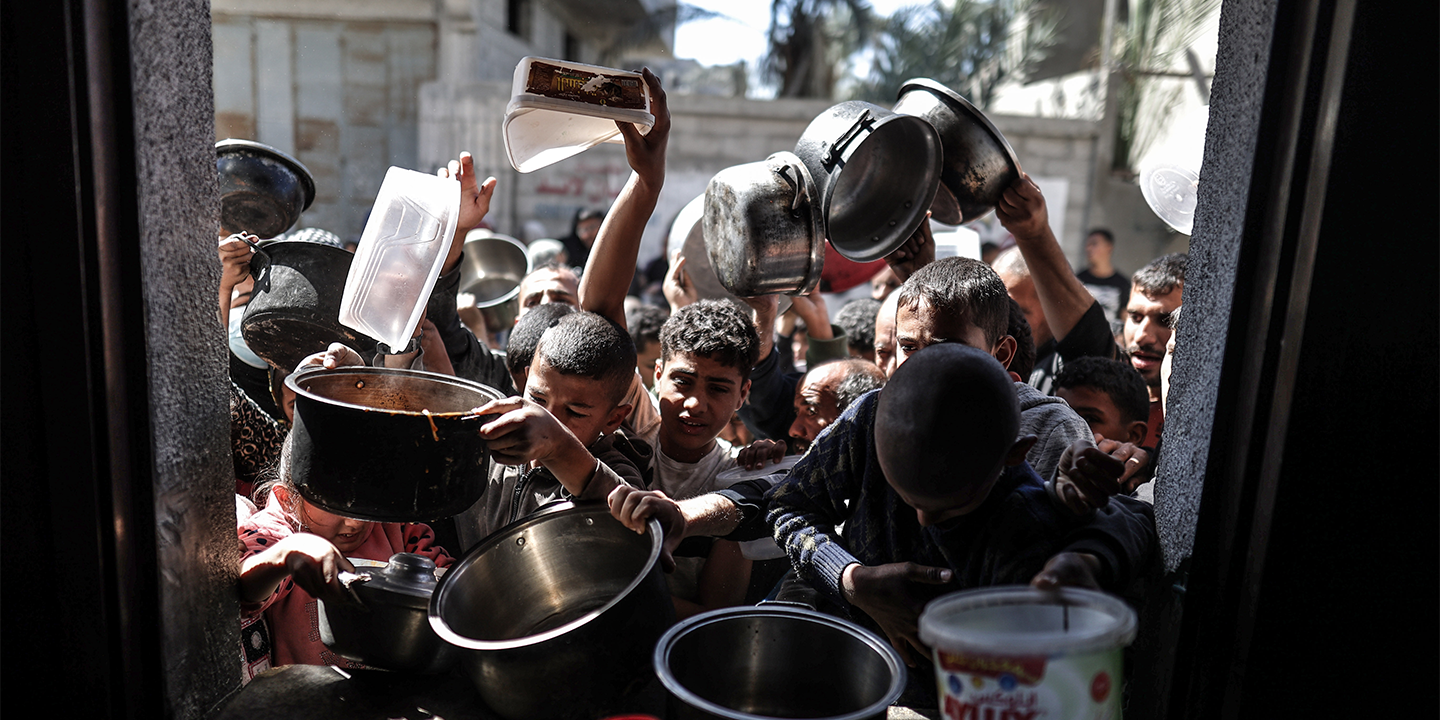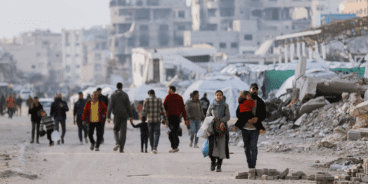

Atrocity Alert No. 385: Israel and the Occupied Palestinian Territory, Burkina Faso and Haiti
Atrocity Alert is a weekly publication by the Global Centre for the Responsibility to Protect highlighting situations where populations are at risk of, or are enduring, mass atrocity crimes.
PATTERN OF ISRAELI FORCES TARGETING PALESTINIANS DESPERATELY SEEKING AID
On Thursday, 29 February, over 118 Palestinians were killed and at least 760 injured in Gaza City while desperately trying to secure life-saving humanitarian aid. Israeli forces opened fire on Palestinians who were approaching aid trucks delivering food supplies on Rashid Road. The mass casualties were caused by shooting, crushing through movement of vehicles and trampling. Israeli forces claim to have only opened fire in a “limited response,” however the Directors of Al-Awda Hospital and Kamal Adwan Hospital reported that majority of those injured being treated at their facilities had gunshot wounds.
Observers and human rights defenders have described the events as “the flour massacre” and international officials, including UN Secretary-General António Guterres, have called for independent investigations. The deadly events received widespread condemnation, even a rare press statement on 2 March by the UN Security Council (UNSC) which expressed “deep concern.” Council members urged Israel “to keep border crossings open for humanitarian aid to enter Gaza, to facilitate the opening of additional crossings to meet humanitarian needs at scale, and to support the rapid and safe delivery of relief items to people in all of the Gaza Strip.”
The Office of the UN High Commissioner for Human Rights (OHCHR) reported that the shooting raises serious concerns of violations of international law. From mid-January to the end of February OHCHR recorded 14 similar incidents involving shooting and shelling by Israeli forces of people gathered to receive aid and life-saving supplies near Gaza City.
The humanitarian catastrophe in Gaza is a direct result of Israel’s tactics, including the siege on Gaza and widespread destruction of civilian infrastructure. Famine is imminent as Israel continues to obstruct the entry and provision of life-saving aid, which likely amounts to the war crime of intentional starvation of civilians as a weapon of war. World Food Programme Deputy Executive Director Carl Skau warned the UNSC that “Gaza is seeing the worst level of child malnutrition anywhere in the world. One child in every six under the age of two is acutely malnourished.” As of 4 March, 15 children have died because of malnutrition and dehydration, however actual numbers are expected to be much higher.
Palestinians in Gaza are being deliberately starved. As the occupying power, Israel has the obligation to ensure the provision of food and medical care for populations in Gaza. Israel is not complying with these and other obligations under International Humanitarian Law, including ensuring safe conditions for the provision of humanitarian aid. Israel must fully cooperate with UN agencies and other humanitarian actors in Gaza to allow free, unimpeded and safe humanitarian access. There must be an immediate ceasefire and all states must halt arms exports to Israel.
STRING OF HORRIFIC MASSACRES IN NORTHERN AND EASTERN BURKINA FASO
Since 24 February nearly 200 civilians have been killed in a spate of brutal attacks in the eastern and northern regions of Burkina Faso. On 25 February approximately 170 civilians, including women and children, were “executed” in a series of attacks on the villages of Komsilga, Nodin and Soroe villages, northern Yatenga province. The prosecutor of the regional Ouahigouya High Court has opened an investigation to establish responsibility and appealed to residents for information regarding the attacks. That same day suspected members of an armed Islamist group launched separate attacks on a mosque in the eastern region, killing 14 civilians, including an imam, and on a Catholic church in northern Essakane, killing at least 15 civilians. Videos showing dozens of victims, including men, women and children, in the eastern villages of Bibjou and Soualimou have also surfaced, according to information collected by Radio France Internationale.
Christine Caldera, Central Sahel expert at the Global Centre for the Responsibility to Protect, said, “There have been few investigations, much less prosecutions for atrocities in Burkina Faso. These attacks deliberately targeting civilians and civilian infrastructure, including places of worship, may constitute war crimes and the perpetrators must be held accountable if such atrocities are to end.” Since 2022 security and civilian protection have severely deteriorated in northern and eastern Burkina Faso as a result of a surge in attacks by armed Islamist groups and abusive counterterrorism operations to confront them.
To curtail the spread of violence and recapture territory lost to armed Islamist groups, Burkinabé military authorities announced a “general mobilization” of the military in April 2023. Since November Burkinabé authorities have abused this law to silence dissent by forcibly conscripting dozens of perceived critics and civil society actors, including human rights defenders, in counterinsurgency operations. In two recent incidents, from 20-21 February two members of the civil society group Balai Citoyen were abducted. On 4 March UN High Commissioner for Human Rights Volker Türk noted, “Enforced disappearances and arbitrary detentions of perceived critics of the transitional authorities appear to be increasing. I am also concerned by reports of forcible conscription.” The following day, the UN Committee on Enforced Disappearances also expressed concern regarding the general mobilization law, stating that the forcible conscription likely amounts to enforced disappearances.
Human rights defenders and others must not be subjected to harassment, intimidation or enforced disappearance. Burkinabé defense and security forces and members of the government-sponsored Volunteers for the Defense of the Homeland must carry out all military operations in strict compliance with international humanitarian and human rights law, ensuring that counterterrorism objectives do not negate universal human rights protections, and take steps to impartially protect civilians at risk. Armed Islamist groups must cease perpetrating senseless attacks on civilian populations.
COORDINATED ATTACKS BY ARMED GANGS THREATENING MILLIONS IN HAITI
On 3 March Haitian authorities declared a 72-hour state of emergency and nighttime curfew following a dramatic escalation in violence in parts of the capital and a massive jailbreak. On Saturday armed gang members stormed Haiti’s two largest prisons, releasing at least 3,800 inmates. One inmate pleaded for help in a post on social media, stating, “They are massacring people indiscriminately inside the cells.” Gangs also launched coordinated attacks on the national soccer stadium, several police stations and the international airport. The Médecins Sans Frontières’ trauma center near the airport was overwhelmed by patients – many of whom were women and children hit by stray bullets. The International Organization for Migration said more than 15,000 people fled gunfire in Port-au-Prince in three days alone, including those already living in makeshift camps at schools, hospitals and squares where they had been previously displaced.
Jimmy Chérizier, a former police officer who now leads the powerful gang alliance known as the G9 Family and Allies, claimed responsibility for the surge in attacks and has issued calls to topple the government. Chérizier also warned residents around Port-au-Prince to keep children – who are particularly vulnerable to the threat of gang violence – from going to school to “avoid collateral damages.”
Over the past year turf wars between the G9 and G-Pèp federation have intensified across the capital, where civilians are facing unprecedented killings, kidnappings, sexual violence, indiscriminate sniper attacks and destruction of property. There has also been a significant rise in violence in the central region of Lower Artibonite, where populations face near-daily abuses as turf wars spread beyond the capital. According to UN figures, January was the most violent month in more than two years, with at least 806 people not involved in the violent exchanges killed, injured or kidnapped.
The recent unrest unfolded as Prime Minister Ariel Henry was in Kenya to sign a reciprocal agreement to allow the deployment of Kenyan police to lead the UN Security Council (UNSC)-mandated Multinational Security Support (MSS) mission to Haiti. Although the MSS was authorized in October, a deployment date has yet to be set. At the end of February, the Bahamas, Bangladesh, Barbados, Benin and Chad formally notified the UN of their intent to contribute personnel to the MSS. The Spokesperson for the UN Secretary-General, Stéphane Dujarric, said the escalation in violence highlights the need for a swift response, stating, “We have been talking for months now about how civilians in Haiti and in Port-au-Prince are basically trapped by gang violence. Schools are closed, hospitals are not functioning, people are suffering on a daily basis.”
The MSS should be urgently deployed and the UNSC should urge troop-contributing countries and donors to implement a human rights due diligence policy. The international community must bolster efforts to curb the flow of illicit weapons and ammunition to gangs in Haiti.
Related Content


Atrocity Alert No. 433: Israel and the Occupied Palestinian Territory, Myanmar (Burma) and Mali
